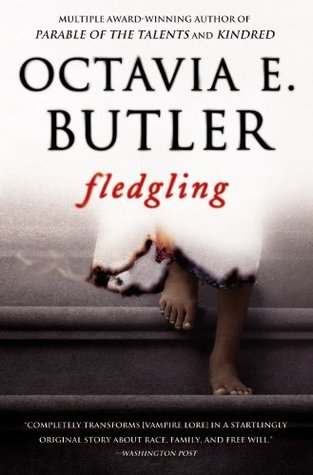Matthew Royal reviewed Fledgling by Octavia E. Butler
Review of 'Fledgling' on 'Goodreads'
2 stars
The protagonist begins her story with no awareness or memory, primordially in a cave, ascending from raw hunger and ignorance of even her name. Every experience and conversation, she remembers or deduces more about who she was, what caused her to lose everything, and how she can take back control over her life.
This is where the archetypal mythos ends. Her character is a "male gaze" trope: hyper-rational underage female who enjoys No Strings Attached sex with older men. It's okay that physically she appears 11 years old, because she's actually a 53 year old vampire.
Record scratch
This is a simplistic story with a specific erotica-like payoff. Like another recent read, Peter Hamilton's book "Reality Dysfunction," which I called "success porn" for its single-minded focus on making its reader/protagonist a success in every scenario, Butler's I'll call "control porn." The protagonist starts incredibly vulnerable, but quickly discovers her power: strength, speed, super healing, and the ability to instantly seduce and control anyone she bites.
More than giving her control of their bodies, her bites make people love her. But she's not better for it. She treats her thralls kindly, and despite her memory loss somehow has an innate moral instinct which justifies her domination. She wins the respect and fear of her own kind for her unique ability to walk in the sunlight. She's the temptation of Tolkien's Galadriel: "All shall love me and despair!"
Ultimately, she discovers who brought her so low and exacts revenge through the vampire justice system, where every reasonable person takes her side. Along the way she recovers her family lands and fortunes, and seduces a business manager to handle everything for her. The end.
This isn't literature; it's a shallow fantasy without metaphor, meaning, or a message. I'm still processing why these fanfic-style stories offend me, and I think it relates to their similarity to a few pulp-style novels I loved as a child: E. E. Doc's groundbreaking sci-fi "Lensman" series and Robert Asprin's "Myth Adventures of Aahz and Skeeve." They are on an endless upward spiral as well, though the former for the improvement and increasing goodness of all of civilization, and the latter, an ever expanding "chosen family" of ragtag characters. Perhaps I should go back and re-read them with older eyes.
Overall, I'm shocked this was written by a Hugo winner, so I'm looking forward to diving into Octavia Butler's acclaimed "Bloodchild" and her Xenogenesis trilogy.

